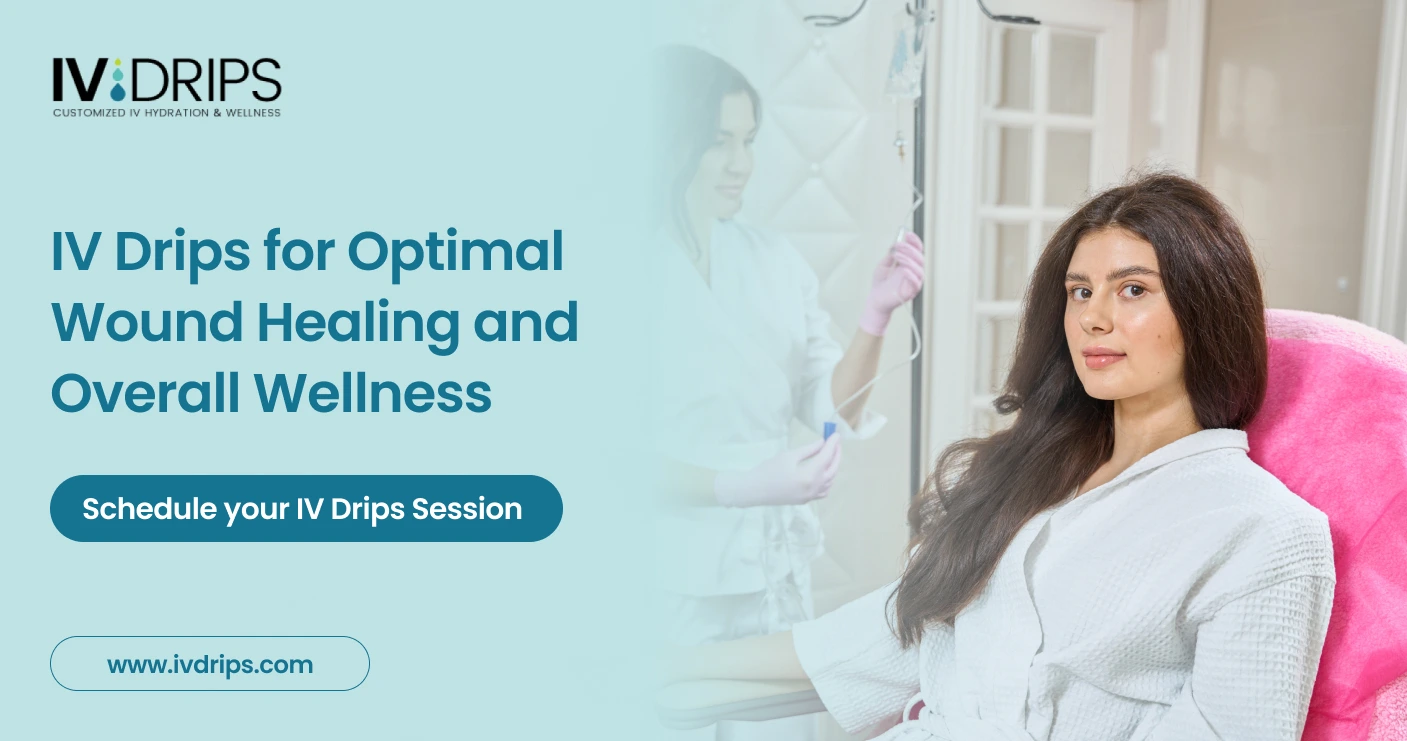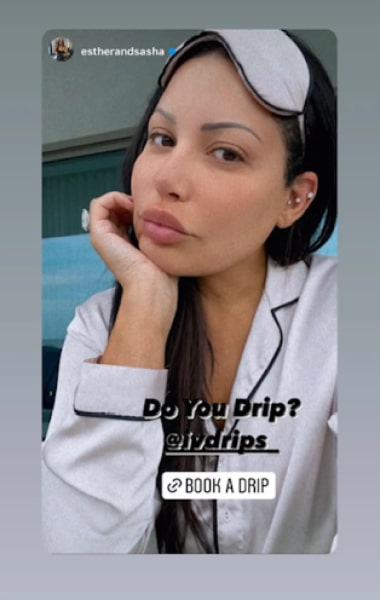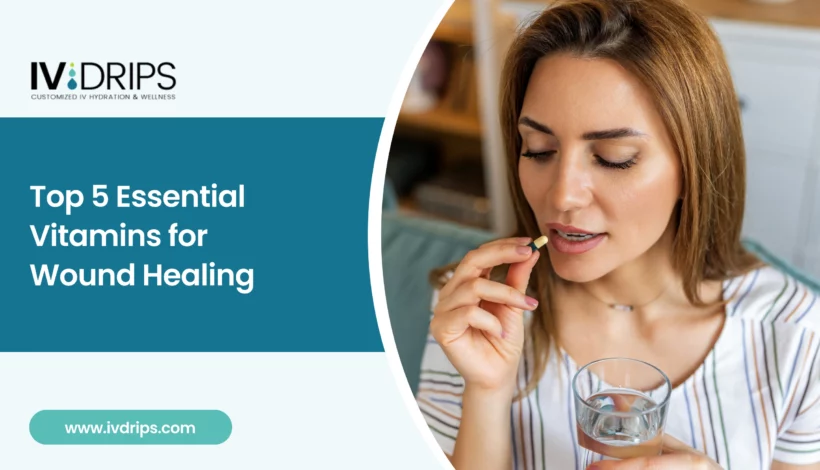
Top 5 Essential Vitamins for Wound Healing
Did you know your body works like a construction site when it comes to healing cuts, scrapes, and scars? Without suitable materials—nutrients like vitamins—it’s like trying to build a skyscraper with duct tape and wishful thinking. These nutrients are crucial for collagen production, reducing inflammation, and accelerating tissue repair.
But healing isn’t just about time; it’s about giving your body the right tools to recover effectively. Vitamins are pivotal in this process, providing the foundation for quicker recovery and better results. Whether rebuilding tissue after surgery or helping a scrape heal cleanly, the proper nutrients can make all the difference.
Proper nutrition becomes essential if you’re recovering from surgery, healing a scrape, or simply gearing up for a big event or game day. But are you unsure which vitamins your body needs for a speedy comeback? Don’t worry—this blog explores the top five vitamins that can help fast-track your healing, prevent infections, and even minimize scarring. Let’s get started!
Wounds and Their Healing Mechanism
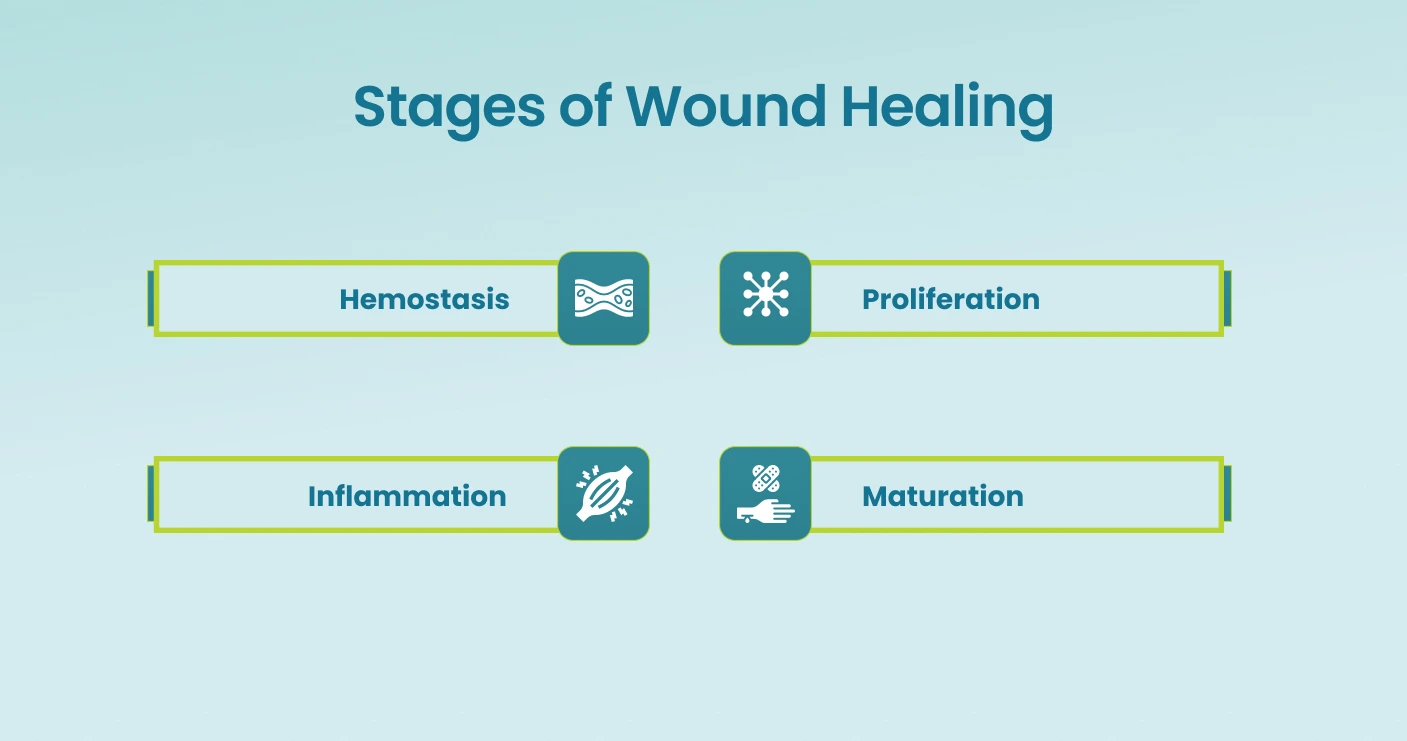
Wounds are injuries to the skin or underlying tissues caused by cuts, burns, surgery, or chronic conditions like diabetes. They are categorized as:
- Acute Wounds: Heal quickly and include minor cuts or surgical incisions.
- Chronic Wounds: These take longer to heal and may result from underlying health issues, such as pressure ulcers or diabetic sores.
- Hemostasis: Blood clots form to stop bleeding.
- Inflammation: The body sends immune cells to fight infections and clear debris.
- Proliferation: New tissue forms and blood vessels regenerate.
- Maturation: The wound closes, and collagen strengthens the tissue.
Nutrition, especially vitamins, is vital for every stage, enhancing cell repair, immune response, and tissue regeneration. Now that you better understand how wounds heal, let’s unveil the much-awaited vitamins for wound healing.
Top 5 Essential Vitamins for Wound Healing
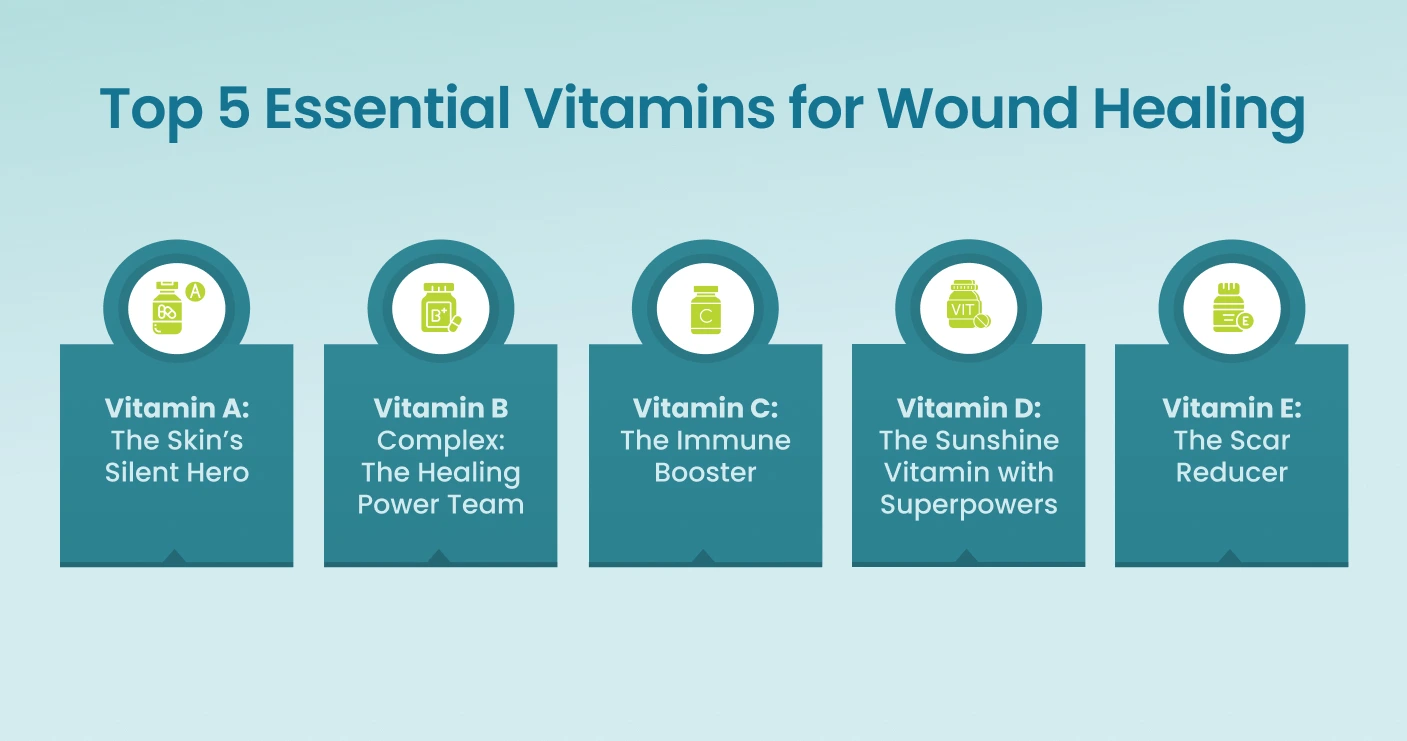
1. Vitamin A: The Skin’s Silent Hero
Role: Vitamin A is a critical player in epithelial cell growth, immunity, and collagen synthesis, which speeds up tissue repair and strengthens the skin’s barrier for faster wound healing.
Sources: Sweet potatoes, carrots, spinach, liver, and fortified dairy products.
Interesting Fact: Did you know that night blindness, often caused by vitamin A deficiency, can delay healing by weakening the body’s immune response? This makes it doubly important for recovery after injuries or surgery.
2. Vitamin B Complex: The Healing Power Team
Role: The B vitamins work together to energize the healing process, supporting red blood cell formation, DNA repair, and tissue growth. Notable mentions:
- B1 (Thiamine): Essential for collagen production.
- B5 (Pantothenic Acid): It promotes skin repair and overall skin health.
- B12: Vital for producing red blood cells that deliver oxygen to damaged tissues.
Sources: Eggs, meat, legumes, nuts, and whole grains.
Fun fact: Did you know that B-group vitamins act like your body’s spark plugs, helping convert carbs, fats, and proteins into the energy your cells need to function?
3. Vitamin C: The Immune Booster
Role: Vitamin C is essential for collagen synthesis, acts as a powerful antioxidant, and bolsters the immune system to prevent infections around wounds.
Sources: Citrus fruits, bell peppers, strawberries, and broccoli.
Quick Fact: Did you know sailors historically carried citrus fruits on long voyages to prevent scurvy? That same vitamin C is just as crucial for healing wounds today as it was for surviving the high seas!
4. Vitamin D: The Sunshine Vitamin with Superpowers
Role: Vitamin D fights inflammation, and promotes skin cell growth. It’s especially beneficial for those prone to chronic wounds.
Sources: Sunlight, fatty fish like salmon, and fortified foods like milk or cereals.
Unique Insight: Studies show that chronic wound patients with adequate vitamin D levels heal faster—and exposure to sunlight doesn’t just boost mood; it accelerates recovery.
5. Vitamin E: The Scar Reducer
Role: Famous for its antioxidant abilities, vitamin E minimizes scarring by protecting cells from oxidative damage. It also supports skin hydration and elasticity during recovery.
Sources: Almonds, sunflower seeds, avocados, and spinach.
Pro Tip: While vitamin E can help reduce scars when applied topically, applying it to open wounds may delay healing. Add it to your diet or apply it once the wounds have closed.
Each of these vitamins brings a unique edge to the healing process. Combining them—whether through diet, supplements, or even IV drips—can give your body the ultimate toolkit for recovery. In the following section, let’s learn more about each.
Food vs. Supplements vs. IV Drips: What’s Better for Healing?
When it comes to healing, the choice between food, supplements, and IV drips depends on your body’s specific needs and the urgency of recovery. Each plays a vital role, but understanding their unique benefits helps you make the right decision.
Food Sources: Nature’s Nutrient Powerhouse
Whole foods are the gold standard for a natural, balanced intake of nutrients. Packed with fiber and phytochemicals, they provide a foundation for overall wellness and long-term recovery. Think vibrant vegetables, lean proteins, and fruits brimming with antioxidants—nature’s way of fueling your body’s repair processes.
When Supplements Step In
Even the best diet can sometimes fail. Chronic conditions, dietary restrictions, or specific healing demands, such as post-surgical recovery, may call for targeted supplements to fill nutritional gaps. These tailored boosters can help speed healing by addressing deficiencies, though moderation is vital to avoiding complications. Always consult with a healthcare provider before introducing supplements to your routine.
Moreover, supplements can fill nutritional gaps when diet alone isn’t enough. Antioxidants like NAC and Glutathione are particularly effective in enhancing recovery. Curious about which is better for you? Check out NAC vs. Glutathione: Comparing Antioxidant Powerhouses for Your Health.
Where IV Drips Fit In The Fast Lane to Recovery
While food and supplements are adequate over time, there are moments when your body craves a more immediate solution. This is where IV drips shine. IV drips deliver a concentrated dose of vitamins and minerals directly to the bloodstream, perfect for individuals struggling with nutrient absorption or facing high recovery demands.
IV Drips: A Game-Changer for Healing
By bypassing the digestive system, IV drips ensure near-complete absorption of essential nutrients, offering unmatched efficiency compared to oral supplements. This rapid nutrient delivery makes them particularly effective for chronic conditions, post-surgical recovery, and anyone needing a quick boost in energy or immunity. Whether it’s to address deficiencies or enhance recovery speed, IV drips complement traditional healing methods.
In summary, food builds the foundation, supplements fill the gaps, and IV drips offer that critical edge when your body needs fast, focused recovery support. Knowing when to turn to each option for optimal healing is crucial. Moreover, did you know that some daily life habits can impact your wound healing? Yes, keep on reading to uncover those.
Lifestyle Factors That Impact Wound Healing
Healing is a holistic process influenced not just by medical care but also by lifestyle choices. Here’s how some crucial factors affect your body’s ability to recover:
- Stress and Sleep: Chronic stress elevates cortisol levels, impairing immune function and slowing the healing process. Conversely, quality sleep is essential for cell repair and regeneration, allowing your body to focus on recovery. Aim for 7-9 hours of restful sleep each night to optimize healing.
- Diet and Habits: A nutrient-rich diet is vital for providing your body with the building blocks for tissue repair. However, habits like smoking and excessive alcohol consumption can sabotage recovery. Smoking reduces oxygen supply to wounds, while alcohol dehydrates the body and hinders immune response. For better healing, quit smoking, reduce alcohol intake, and prioritize balanced meals.
- Hydration: Staying hydrated ensures efficient nutrient transport to damaged tissues and maintains skin elasticity, aiding wound closure. Dehydration, however, can slow cellular repair and reduce the effectiveness of other healing interventions.
- Physical Activity: While rest is crucial, light physical activity like walking improves blood circulation, ensuring oxygen and nutrients reach the wound site. Overexertion, however, can strain the healing process, so finding a balance is essential.
- Underlying Health Conditions: Diabetes, obesity, or chronic inflammation can significantly impact wound healing. Proper management of these conditions through medication, lifestyle changes, and regular check-ups is vital to promoting recovery.
Moreover, certain groups are more vulnerable to impaired wound healing and require specialized care:
- Elderly: Reduced collagen production with age slows tissue repair, making adequate vitamin intake essential.
- Diabetics: High blood sugar impairs circulation and healing; nutrients like vitamin C and zinc can aid recovery.
- Immunocompromised Individuals: Weakened immune systems benefit from tailored diets or supplements to support repair.
For effective healing, these individuals should seek personalized guidance from healthcare professionals.
Here, we conclude with our list of essential vitamins for wound healing. Incorporating these vitamins into your daily diet or targeted supplementation can accelerate healing and minimize complications. You may add the respective food sources to your daily diet or take supplements. Still, if you need personalized care for peak performance and potentially faster results (as compared to diet and additional supplementation methods), IV Drips should be your go-to destination!
IV Drips for Optimal Wound Healing and Overall Wellness
Wound healing and overall wellness often depend on addressing underlying imbalances or deficiencies in the body. IV Drips provide a direct and efficient way to deliver essential nutrients, promoting faster recovery and sustained vitality from within.
Our IV drips support your body’s natural healing processes by directly delivering deep hydration and nutrients to your bloodstream for maximum absorption. Opt for our Immunity Drip to boost your defenses and enhance recovery, or customize your blend of multivitamins and minerals with our DIY Drip to suit your unique wellness needs.
Ready to optimize your healing and overall well-being? Schedule your IV Drips session now!
Posted on behalf of IVDrips
